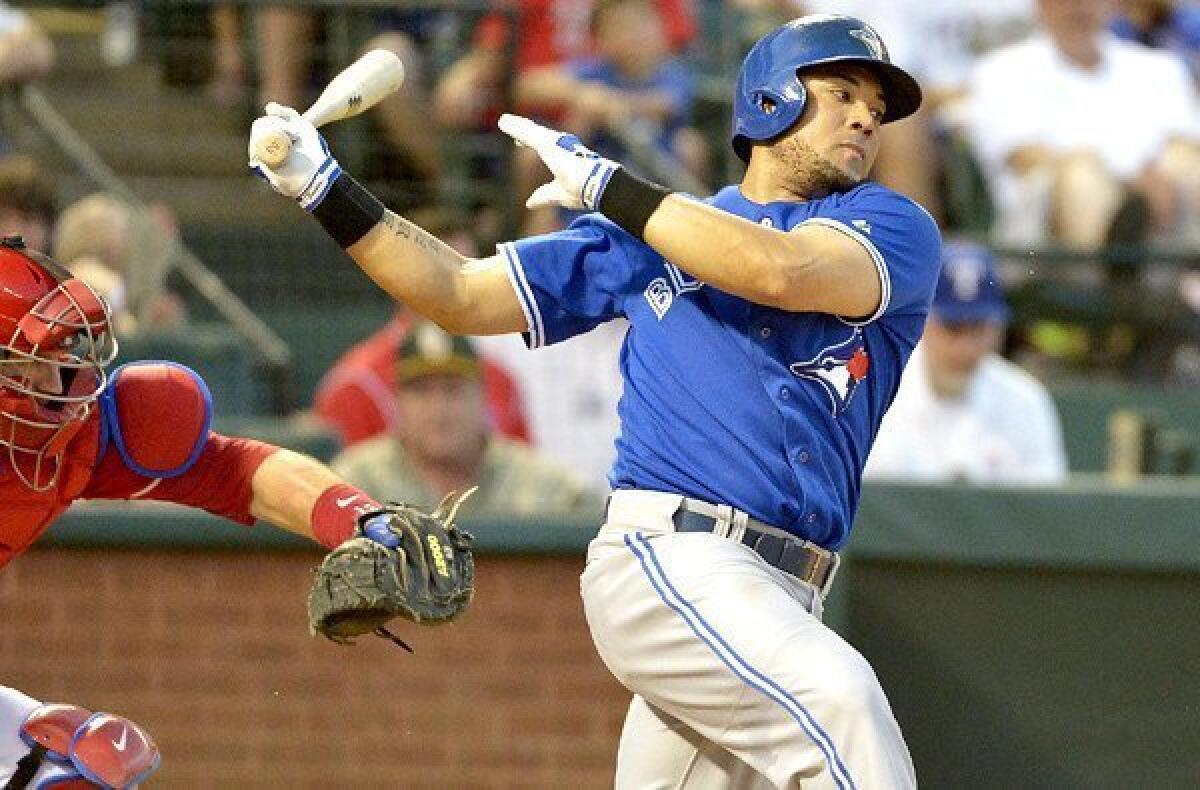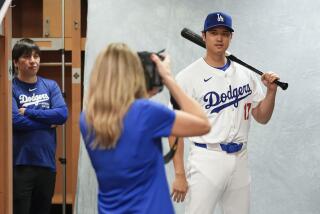Baseball players say they want to clean up the game

- Share via
SEATTLE — When cyclist Lance Armstrong was found to have used performance-enhancing drugs last fall, he was publicly disgraced, stripped of his seven Tour de France titles and banned from the sport for life.
When outfielder Melky Cabrera tested positive for PEDs last summer, he was suspended 50 games. Then two months later he was rewarded with a two-year $16-million contract, by far the richest of his career.
It’s a loophole that has undermined baseball’s get-tough approach to drugs and weakened the strongest drug-testing program in U.S. professional team sports. And now the players themselves may be ready to do something about it, with many calling for stronger sanctions for PED cheats.
“There’s been a lot of talk about what could happen next as far as the guidelines and punishments and penalties for failure to adhere to the standards and testing,” says Houston catcher Jason Castro, the Astros’ representative to the powerful MLB Players Assn.
“Obviously there’s a want [among] the majority of the guys in the game to keep baseball clean. Players are getting very involved. And it’s a good thing to see because it’s our careers and it’s our game and we want a level playing field.”
The subject took on new urgency last week when baseball stepped up its investigation into a closed South Florida wellness clinic that allegedly distributed steroids, synthetic testosterone and human growth hormone to as many as 20 major league players, making it potentially the worst single PED case in U.S. sports history.
Baseball’s current drug policy calls for a 50-game ban for a first positive test and a 100-game suspension for a repeat offense. And since penalties went into effect in 2005, 39 major leaguers have been suspended — three of them twice.
But the protocol says nothing about what happens when a player comes back from suspension, which is why Cabrera is not the only one who has cashed in thanks to drug-enhanced statistics.
A week after Cabrera tested positive for testosterone last August, Oakland pitcher Bartolo Colon failed the same test; he later re-signed with the Athletics for a $1-million raise. And Manny Ramirez, one of three players to fail two drug tests, is still owed more than $8 million by the Dodgers.
That turns what should be a deterrent to cheat into an incentive.
“Given the rewards — particularly in pro baseball, where the money is so big — you have to have severe penalties that sufficiently protect the clean athletes,” says Travis Tygart, chief executive of the U.S. Anti-Doping Agency. “And it is frustrating for clean athletes when a guy does get caught, sits out 50 games, but then comes back and signs a huge multimillion contract that another athlete rightly deserved because they were playing within the rules.”
Baltimore reliever Darren O’Day, the Orioles’ assistant player representative, agrees.
“Until the suspensions become so prohibitive that guys don’t risk it, that’s going to continue to happen,” he says. “You have to catch the guys who are playing on an uneven field.”
Again, consider the case of Cabrera, MVP of last summer’s All-Star game. He was leading the National League with a .346 average, more than 60 points above his lifetime mark, when he was suspended last year. This year he’s batting a more-typical .286 for the Toronto Blue Jays, but his presence has cost Rajai Davis a starting spot — and his contract, the fifth-largest on the team, probably cost someone else some money.
One way to prevent players from profiting from cheating would be to limit the number of teams a suspended player could negotiate with after serving his penalty. Or a player’s salary could be frozen at the league’s minimum wage for a season.
“I wouldn’t rule anything out,” O’Day says. “There’s more money in cheating than catching cheaters, and until that changes … I don’t think anything should be taken off the table. All of them should be considered.”
Such anger — and resolve — is an encouraging sign to Tygart, who remembers when the union had to be shamed into agreeing to even a modest drug-testing protocol.
“You never heard that in the past in baseball,” he says of the players’ call to action. “In fact, you heard the opposite. That athletes feel the confidence to step forward and vocalize their desire to have clean sport and have sport played by the rules, I think that speaks volumes about what’s really going on.”
But money isn’t the only reason players want to clean up their game. In fact, it might not even be the most important one. Because as long as the cloud of PED use hovers above the game, hard work will continue to get confused with cheating. And clean players are tired of having their accomplishments tainted by the actions of others.
“Unfortunately now, whenever anybody does something great, there’s always a hint or a suggestion that, ‘Is this really on their own merits?’ And that’s not fair, that’s not right,” Dodgers catcher A.J. Ellis says. “We want to be known for our own hard work and our own skill and the work we put in in the weight room and the work we put in in the batting cages and on the pitching mound. We should be credited for what we do as opposed to second-guessed.
“It’s the state of our game right now and it’s unfortunate. That’s the normal response as opposed to congratulatory. It’s tough when that’s the natural inclination is to second-guess and doubt.”
The players can’t do anything on their own, though, because any changes in baseball’s drug policy have to be negotiated with the owners. And that could be a problem because the union probably would seek nuanced language to protect players who say they did not intentionally take a banned substance — something the owners say they would oppose as nothing more than a new avenue for cheating.
“Guys who deliberately bend the rules and do what they were doing, as opposed to guys who are caught with a tainted GNC supplement, it would be nice if there was a difference between the two,” the Angels’ Mark Trumbo says. “For deliberate cheaters, I say throw the book at them.”
But for that to work, the book’s going to have to be edited first, says reliever Heath Bell of the Arizona Diamondbacks.
Bell, whose off-season training regime once consisted of playing Nintendo Wii with his kids, said his performance on the field has never been linked to PEDs.
“I’ve always been a fat kid who threw hard,” he says. “I don’t think anybody thinks I do anything.”
But the game won’t be healthy until everyone’s performance is as genuine as the fat kid who throws hard.
“We just want the game to be as clean as possible without somebody trying to cheat the system,” Bell says. “We just want to make sure the system doesn’t have any loopholes. Unfortunately, it does, but I think we’re trying to clean it up.”
twitter.com/kbaxter11
Times staff writers Mike Hiserman and Mike DiGiovanna contributed to this report.
More to Read
Go beyond the scoreboard
Get the latest on L.A.'s teams in the daily Sports Report newsletter.
You may occasionally receive promotional content from the Los Angeles Times.











